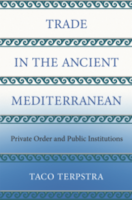
Princeton (2019) h/b 296pp £30 (ISBN 9780691172088)
T. is Assistant Professor of classics and history at North West University. His previous book (2013) was Trading Communities in the Roman World. In this volume (published within the Princeton ‘Economic History of the Western World’ series), T. is particularly concerned about how the trading communities of the Mediterranean managed to maintain reasonably efficient contract relationships in circumstances where the state provided no enforcement of any resolutions of disputes or dishonesty. He argues that the infrastructure support that the state for most of his period implicitly gave to trading communities—by the proxenos system in the pre-Roman period and by the pervasiveness of the Roman legal system under the Empire—provided sufficient certainty of outcomes for trading communities to flourish.
This is a book by a scholar for other scholars. It assumes that the reader has previous knowledge both of the primary facts about ancient Mediterranean trade and the main academic disputes to which they give rise. T. discusses trade diaspora (with particular reference to the Phoenician community); the interface between official and private trading in the mid-third century BC Middle East; how the unification of the Mediterranean basin under Rome still required private sector arrangements for dispute management; the effects on trade of institutionalised Christianity (negative in his view); and the weakening of the Empire, including the role played by trade. The text is supported by 9 illustrations and 6 maps and a comprehensive 29 page bibliography.
The statistical evidence for his arguments is inevitably sparse, but the text comes alive when T. is able explore in detail, for example, the pattern of shipwrecks in the Mediterranean between 1500 BC and AD 1500; the caches of papyri from Zenon in Ptolemaic Egypt, or the Campanian tablets buried in the Vesuvius eruption of AD 79. His analysis of how the order in which witnesses signed contract documents in the Empire period was determined by their social status is similarly fascinating.
T. is perhaps less persuasive when his background evidence is less complete. His conclusion, for example, that the onset of institutionalised Christianity had a long term negative effect on Mediterranean commerce arguably fails to distinguish that effect from several other competing influences. He has, however, satisfactorily demonstrated that Mediterranean trade would not have enhanced economic performance as much as it did without the implied support of state infrastructure added to occasional direct support (such as building harbours).
Roger Barnes
